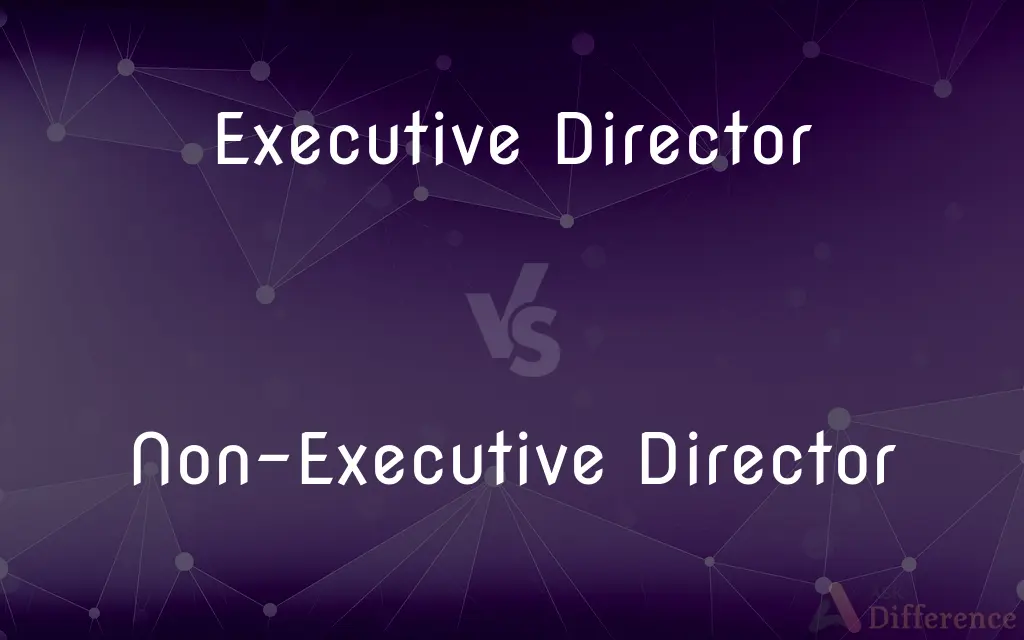Executive Director vs. Non-Executive Director — What's the Difference?
Edited by Tayyaba Rehman — By Fiza Rafique — Published on December 28, 2023
Executive Directors are part of a company's management and have daily operational roles, while Non-Executive Directors provide oversight and advice without daily operational duties.

Difference Between Executive Director and Non-Executive Director
Table of Contents
ADVERTISEMENT
Key Differences
Executive Directors and Non-Executive Directors play crucial roles in the governance structure of companies. The Executive Director is typically a senior member of the management team, actively involved in the day-to-day operations and decision-making processes of the company. They possess a detailed understanding of the company's business model, challenges, and strategies and often hold key responsibilities in executing the company's vision.
In contrast, a Non-Executive Director does not participate in the daily management or operations of the company. Instead, their primary role is to provide independent oversight, bringing in an external perspective, and ensuring that the company's interests align with those of its shareholders. Their involvement is more strategic, often contributing through participation in board meetings and offering advice based on their expertise.
The distinction between an Executive Director and a Non-Executive Director can often be seen in their time commitment to the company. Executive Directors, being part of the company's management, usually have full-time roles and are integral to the company's daily functioning. Non-Executive Directors, on the other hand, have less frequent engagements, primarily attending board meetings and specific committee meetings.
The compensation structure for an Executive Director and a Non-Executive Director may also differ. Executive Directors often receive salaries, bonuses, and other benefits in line with their operational roles and responsibilities. Non-Executive Directors, however, typically receive compensation in the form of director's fees, and sometimes, stock options, reflecting their advisory and oversight roles.
Both roles, while distinct, are vital for a company's effective governance. While Executive Directors drive the company towards its goals through hands-on management, Non-Executive Directors ensure a balanced and objective viewpoint, helping in risk management and strategic decision-making.
ADVERTISEMENT
Comparison Chart
Role in Company
Actively involved in day-to-day operations.
Provides independent oversight and strategic advice.
Time Commitment
Full-time, integral to daily functioning.
Less frequent, mainly for board and committee meetings.
Compensation
Salaries, bonuses, benefits aligned with operational roles.
Typically director's fees and possibly stock options.
Level of Involvement in Operations
Direct involvement in daily management and decision-making.
No direct involvement in daily operations.
Primary Purpose
Drive company's goals through hands-on management.
Ensure balanced and objective viewpoint, aiding in strategic decisions.
Compare with Definitions
Executive Director
Executive Director holds a key position in the company's management team.
The Executive Director held a meeting to discuss the quarterly results.
Non-Executive Director
Non-Executive Director is not involved in a company's day-to-day management.
As a Non-Executive Director, Lisa only attended monthly board meetings.
Executive Director
Executive Director leads and manages a company's operations.
Jane, as the Executive Director, implemented the new business strategy.
Non-Executive Director
Non-Executive Director brings external expertise to board discussions.
With his tech background, the new Non-Executive Director brought valuable insights.
Executive Director
Executive Director often holds decision-making responsibilities.
The merger was approved by the Executive Director last week.
Non-Executive Director
Non-Executive Director provides strategic advice without daily operational roles.
The Non-Executive Director recommended exploring new market segments.
Executive Director
Executive Director is involved in daily operational duties.
As the Executive Director, Mark reviewed the production line every week.
Non-Executive Director
Non-Executive Director ensures alignment with shareholder interests.
The Non-Executive Director emphasized transparency in the company's annual report.
Executive Director
Executive Director plays an active role in executing company strategies.
Under the Executive Director's guidance, the company saw record growth.
Non-Executive Director
Non-Executive Director offers independent oversight to a company.
The board appointed a Non-Executive Director to ensure unbiased reviews.
Common Curiosities
Is the Executive Director part of the company's management team?
Yes, the Executive Director is a senior member of the management team with active involvement in operations.
Do Executive Directors work full-time?
Yes, Executive Directors typically have full-time roles integral to the company's daily functioning.
What is the main role of an Executive Director?
An Executive Director leads and manages a company's day-to-day operations and decision-making processes.
How often does a Non-Executive Director engage with the company?
Non-Executive Directors mainly engage during board and committee meetings, which can be monthly, quarterly, or as required.
Can an Executive Director participate in board meetings?
Yes, Executive Directors often participate in board meetings, representing the management's perspective.
Who drives the company's strategies, the Executive or Non-Executive Director?
The Executive Director plays an active role in executing company strategies, while the Non-Executive Director offers strategic advice.
How does a Non-Executive Director contribute to a company?
A Non-Executive Director provides independent oversight, strategic advice, and ensures alignment with shareholder interests.
Why are Non-Executive Directors important for a company?
Non-Executive Directors bring an external perspective, ensure objective decision-making, and align company actions with shareholder interests.
What's the primary difference between an Executive and Non-Executive Director's role?
Executive Directors manage day-to-day operations, while Non-Executive Directors offer strategic advice and oversight without daily operational duties.
Is it necessary for a company to have both Executive and Non-Executive Directors?
While specific requirements vary by jurisdiction, having both ensures effective governance with operational leadership and independent oversight.
Do Non-Executive Directors receive salaries like Executive Directors?
Typically, Non-Executive Directors receive director's fees, not regular salaries, and may also get stock options.
Do Non-Executive Directors have decision-making powers?
Non-Executive Directors contribute to decisions at the board level, providing advice and voting on key matters.
Are Non-Executive Directors independent from the company?
Yes, Non-Executive Directors are meant to provide an independent and external viewpoint to the company.
Between the Executive Director and Non-Executive Director, who has a more hands-on role?
The Executive Director has a more hands-on role, managing day-to-day operations and executing strategies.
How does the compensation of an Executive Director differ from a Non-Executive Director?
Executive Directors receive salaries and benefits based on their operational roles, while Non-Executive Directors typically receive director's fees and possible stock options.
Share Your Discovery

Previous Comparison
FIR vs. Chargesheet
Next Comparison
Red Kangaroo vs. Grey KangarooAuthor Spotlight
Written by
Fiza RafiqueFiza Rafique is a skilled content writer at AskDifference.com, where she meticulously refines and enhances written pieces. Drawing from her vast editorial expertise, Fiza ensures clarity, accuracy, and precision in every article. Passionate about language, she continually seeks to elevate the quality of content for readers worldwide.
Edited by
Tayyaba RehmanTayyaba Rehman is a distinguished writer, currently serving as a primary contributor to askdifference.com. As a researcher in semantics and etymology, Tayyaba's passion for the complexity of languages and their distinctions has found a perfect home on the platform. Tayyaba delves into the intricacies of language, distinguishing between commonly confused words and phrases, thereby providing clarity for readers worldwide.














































